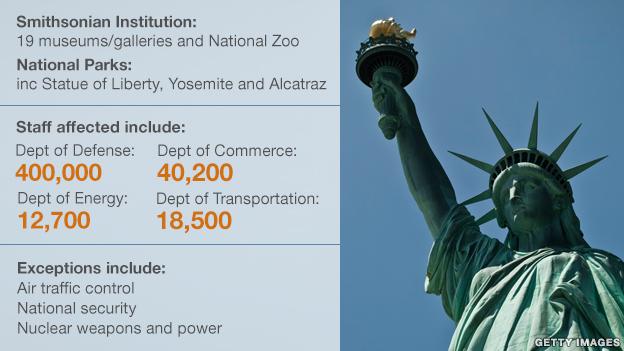Obama: Republicans using 'extortion' on debt limit
- Published
Obama: "Stop forcing John Boehner to issue threats about our economy"
US President Barack Obama has said he is willing to hold budget talks with Republicans, but not until they agree to lift "threats" against the economy.
Republicans "don't get to demand ransom in exchange for doing their jobs", Mr Obama said, by demanding concessions in policy before reopening government.
The US government shut down last week when Congress failed to agree a budget.
Republican leaders on Tuesday renewed their calls for Mr Obama to open negotiations over ending the impasses.
Republican House Speaker John Boehner told reporters: "What the president said today was if there's unconditional surrender by Republicans, he'll sit down and talk to us. That's not the way our government works."
'Very deep recession'
But at the White House, Mr Obama said any negotiations on the ongoing government shutdown or the debt limit "shouldn't require hanging the threats of a shutdown or economic chaos over the heads of the American people".
"We can't make extortion routine as part of our democracy," the Democratic president said. "Democracy doesn't function this way.
"And this is not just for me. It's also for my successors in office, whatever party they're from."
He also warned of the repercussions of defaulting on the government's debt should Congress fail to raise the borrowing limit, currently set to be reached on 17 October.
Mr Obama said breaching the borrowing limit could disrupt capital markets, undermine international confidence in America, permanently increase the nation's borrowing costs, add to its deficits and debt, and pose the "significant risk of a very deep recession".
House Democrats plan to meet the president at the White House on Wednesday, the first in a series of meetings between Mr Obama and lawmakers.
The US government partially shut down operations on 1 October after Republicans who control the House of Representatives refused to approve a budget, saying they would only do so if Mr Obama's healthcare reform law were delayed or stripped of funding.
Mr Obama and the Democrats have thus far refused, noting the law was passed in 2010, subsequently approved by the Supreme Court, and was a central issue in the 2012 election which Mr Obama won.
'Too much shock'
At the same time, the Republicans have refused to approve an increase in the US debt limit unless it is accompanied by significant spending cuts and other policy concessions.
US shutdown felt in Washington as debt limit deadline looms
Mr Obama maintains Mr Boehner could end the current government showdown by allowing the House to vote on a "clean" budget bill that does not alter the health law, because that could pass with votes from both Democrats and moderate Republicans.
But doing so would risk damaging his standing with the most conservative elements of his caucus, analysts say.
US and foreign officials and economists have warned of severe economic consequences if the US defaults on its debt because the government is unable to borrow money to fund its obligations.
"Failure to lift the debt ceiling would be a major event. Prolonged failure... would almost surely derail the US recovery," said International Monetary Fund economic counsellor Olivier Blanchard on Tuesday.
At the White House, Mr Obama said if the US eventually dealt with the impasse, then "folks around the world will attribute this to the usual messy process of American democracy".
Scott Gediman: "We heard everything from people shouting profanities, speeding by entrance stations... getting very frustrated", he added.
He also sought to reassure US bond holders and others that the country remained good for its debts, despite the shutdown.
The shutdown has already had a significant impact in the US.
Hundreds of thousands of workers have been sent home without pay, national parks, museums, and tourists sites have been closed, research has halted, and more.
Visitors to the iconic Grand Canyon in Arizona have got no further than locked gates around the site, which normally attracts 18,000 visitors a day as weather cools.
Workers in small towns that depend on Grand Canyon tourism for their livelihoods are having to resort to food banks.
